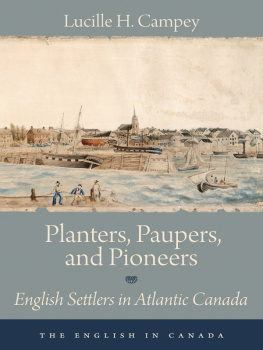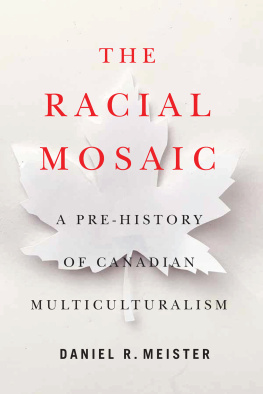The Warmth of the Welcome
The Warmth of the Welcome
Is Atlantic Canada
a Home Away From Home
for Immigrants?
Edited by
Evangelia Tastsoglou
Alexandra Dobrowolsky
Barbara Cottrell
CAPE BRETON UNIVERSITY PRESS
SYDNEY, NOVA SCOTIA
Copyright 2015 Cape Breton University Press
All rights reserved. No part of this work may be reproduced or used in any form or by any means, electronic or mechanical, including photocopying, recording or any information storage or retrieval system, without the prior written permission of the publisher. Cape Breton University Press recognizes fair dealing uses under the Copyright Act (Canada). Responsibility for the research and permissions obtained for this publication rests with the authors and editors.
Cape Breton University Press recognizes the support of the Province of Nova Scotia, through the Department of Communities, Culture and Heritage and the support received for its publishing program from the Canada Council for the Arts Block Grants Program. We are pleased to work in partnership with these bodies to develop and promote our cultural resources.
Cover image: Picnic on Snow , 2014, by Najma Sharif, Halifax, NS.
Cover design: Cathy MacLean Design, Chticamp, NS
Layout: Mike Hunter, Port Hawkesbury and Sydney, NS
Copyediting: Katie Yantzi, Toronto, ON
First printed in Canada.
eBook development: WildElement.ca
Library and Archives Canada Cataloguing in Publication
Tastsoglou, Evangelia, author
The warmth of the welcome : is Atlantic Canada a home away
from home for immigrants? / Evangelia Tastsoglou, Alexandra
Dobrowolsky, Barbara Cottrell.
Includes bibliographical references and index.
Issued in print and electronic formats.
ISBN 978-1-927492-99-4 (pbk.).--ISBN 978-1-927492-15-4 (pdf).--
ISBN 978-1-927492-16-1 (epub).--ISBN 978-1-927492-17-8 (kindle)
1. Immigrants--Atlantic Provinces. 2. Immigrants--Cultural
assimilation--Atlantic Provinces. 3. Naturalization--Atlantic Provinces.
4. Immigrants--Atlantic Provinces--Attitudes. I. Dobrowolsky,
Alexandra Z. (Alexandra Zorianna), 1964-, author II. Cottrell,
Barbara, 1945-, author III. Title.
JV7220.T37 2015 305.90691209715 C2015-901163-9
C2015-901164-7
Cape Breton University Press, 1250 Grand Lake Road, Sydney, NS B1P 6L2 CA
www.cbupress.ca
The Warmth of the Welcome
Table of Contents
Section 1
Welcoming Communities?
The Backdrop to Immigration in Atlantic Canada
At Home, Down East?
Immigration, Integration and Belonging in Atlantic Canada
Evangelia Tastsoglou
Alexandra Dobrowolsky
Barbara Cottrell
I. Why Look at Immigration, Integration and Belonging in Atlantic Canada?
Atlantic Canada, comprised of the four eastern-most Canadian provinces (New Brunswick, Newfoundland and Labrador, Nova Scotia and Prince Edward Island) is a region of many fine features and inviting qualities. It is renowned for its lengthy coastlines and rural expanses, along with a smattering of lively, smallish cities, a reputedly slower pace and its people who are often portrayed as welcoming, warm and friendly. The allure of Atlantic Canada has been widely publicized to assorted, targeted groups. For example, alongside colourful pictures of stunning seascapes, we have it all! is the emphatic catchphrase used to draw tourists to the region ( http://www.atlanticcanadatourism.com /).
To attract immigrants, mayors in Atlantic Canada have promoted the regions purportedly high quality of life, contrasting it with the challenges of big city existence. In the mayors pitch to newcomers, healthy and safe communities and a lower cost of living, including lower housing prices, are featured in the hope that these considerations will entice immigrants to move to, and settle in, Atlantic Canada (see http://www.canadavisa.com/quality-of-life-will-attract-immigrants.html ). But for immigrants especially, how much of this is rhetoric, and how much of this is reality? Is Atlantic Canada truly welcoming, and what really makes it a home away from home for newcomers in the region? These queries lie at the heart of this edited collection. Such questions, and the answers to them, are timely and relevant because, in recent years, alongside the mayors appeals noted above, an array of constituencies (e.g., multiple levels of government, businesses, academics, community representatives) across Atlantic Canada have become much more concerned with the attraction and retention of immigrants to the region. For instance, several chapters in this volume examine the launch and evolution, over the last decade or so, of provincial immigration agreements with the federal government in the form of provincial nominee programs (or PNPs). At the same time, not only the public sector (federal, provincial and municipal), but the private and voluntary sectors have been enlisted to attract and retain newcomers to Atlantic Canada. Other chapters illustrate how community groups and individuals, even in remote areas, have also engaged in concerted campaigns to create a more welcoming environment for newcomers.
This growing awareness of the need for immigrants to come and to stay in the region corresponds to several worrisome socio-economic, political and demographic developments. Today, Atlantic Canada faces a series of grim demographic challenges that include: low birth rates; an aging population; and issues around rural de-population (Akbari and Mandale 2005; Murphy and de Finney 2008; Yax-Fraser and Tastsoglou 2008). Historically and presently, the region has also experienced recurring problems with out-migration and fluctuating immigrant retention rates (Dobrowolsky and Ramos 2014). Concomitantly, its economic health and growth potential varies from province to province, and especially from urban to rural locales. Politicians, business people and economists have identified Atlantic Canadas close to zero population growth (ZPG) condition as representing an economic problem, because it contributes to lower rates of growth in the economy (Freedman 2011: 173). Immigration has, in turn, been identified not only as the answer to these demographic shortfalls, but also as the key to boosting the regions economic competitiveness. These connections were stressed most recently in Nova Scotias Commission on Building a New Economy recommendations, commonly referred to as the Ivany Report (Ivany et al. 2014).
The roots of the present situation run very deep. For example, as will be discussed in more detail below, Atlantic Canadas history of out-migration can be traced as far back as the early years of Canadas very existence. This countrys first Prime Minister, Sir John A. Macdonald, not only encouraged western colonization, but concentrated manufacturing in the centre of Canada with his first National Policy. With this shift of the population and economic and industrial weight westward, de-industrialization, resource and population depletion occurred in eastern parts of the country and have continued ever since (Brodie 1990). For the same reasons that those born in Atlantic Canada left (and still leave) the area, most new waves of immigrants bypassed the region on their way west. As Canadas growing population concentrated in its major and mid-sized metropolitan centres, the Atlantic region remained relatively rural in comparison to other parts of the country (Desjardins 2011: 292).









